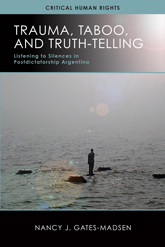|
Trauma, Taboo, and Truth-Telling
Listening to Silences in Postdictatorship Argentina
Nancy J. Gates-Madsen
Critical Human Rights
Steve J. Stern and Scott Strauss, Series Editors
In the aftermath of state terror, silence carries its own deep meanings
Argentina’s repressive 1976–83 dictatorship, during which an estimated thirty thousand people were “disappeared,” prompted the postauthoritarian administrations and human rights groups to encourage public exposure of past crimes and traumas. Truth commissions, trials, and other efforts have aimed to break the silence and give voice to the voiceless. Yet despite these many reckonings, there are still silences, taboos, and unanswerable questions.
Nancy J. Gates-Madsen reads between the lines of Argentine cultural texts (fiction, drama, testimonial narrative, telenovela, documentary film) to explore the fundamental role of silence—the unsaid—in the expression of trauma. Her careful examination of the interplay between textual and contextual silences illuminates public debate about the meaning of memory in Argentina—which
stories are being told and, more important, which are being silenced. The imposition of silence is not limited to the military domain or its apologists, she shows; the human rights community also perpetuates and creates taboos.
 Nancy J. Gates-Madsen is an associate professor of Spanish
at Luther College. She is the cotranslator of Violet Island and Other Poems by Reina María Rodríguez.
Nancy J. Gates-Madsen is an associate professor of Spanish
at Luther College. She is the cotranslator of Violet Island and Other Poems by Reina María Rodríguez.
Praise
“Opens our ears to silences and their meanings. Gates-Madsen persuasively shows how the unsaid shapes memories of the traumatic past. An outstanding contribution to the study of human rights memory.”
—Rebecca J. Atencio, author of Memory’s Turn: Reckoning Dictatorship in Brazil
“This richly insightful analysis makes perceptible the way silence shifts, from being imposed by a military regime to silence as a legacy of this era.”
—Cynthia Milton, Université de Montréal
|

Larger images
New in Paperback!
July 2018
LC: 2015036813 F
256 pp. 6 x 9
4 b/w illus.
|

